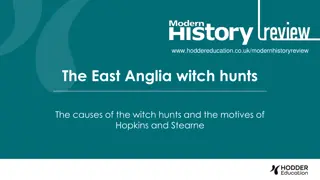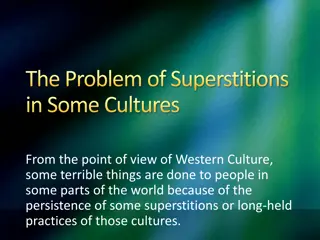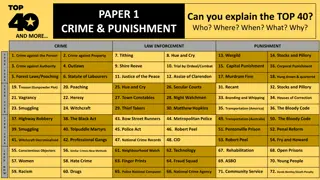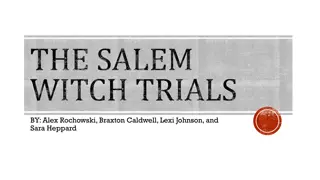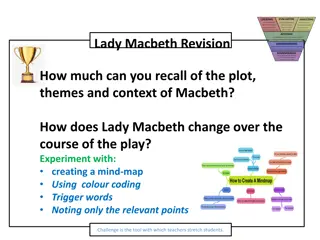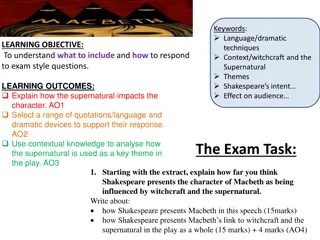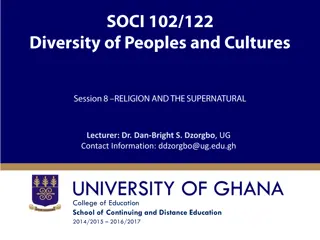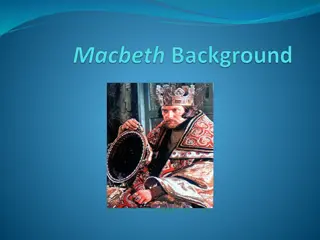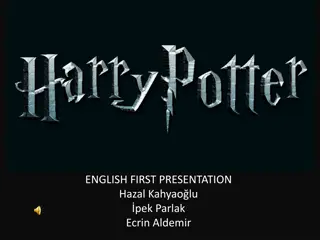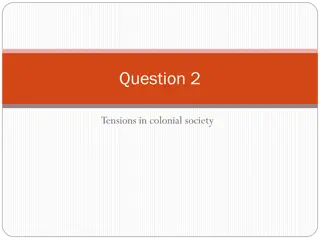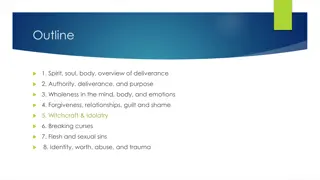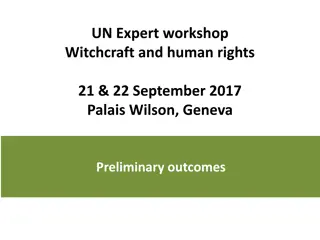Witch Hunts in East Anglia: Causes and Motives Behind the Witch Hunt Led by Hopkins and Stearne
Witch hunts in East Anglia between 1645 and 1647 were influenced by a combination of economic and political factors. The disastrous agricultural conditions of the mid-1640s, high taxation, poverty, and political turmoil contributed to the witch hysteria. Accusations were primarily driven by tensions
3 views • 17 slides
Student Affairs Competition at American Welsh Green University
This case study competition at American Welsh Green University involves a team consisting of Carrie Hachadurian, Dean Martin, and Dean Paulk. The university, located in North Carolina, emphasizes training in wizardry and witchcraft to support comprehensive student learning and development. The team
0 views • 18 slides
Cultural Challenges: Addressing Superstitions and Harmful Practices
Various cultures uphold long-standing superstitions and harmful practices, such as female infanticide and belief in witches, raising ethical dilemmas for Western observers. While understanding cultural contexts is crucial, confronting atrocities like children being accused of witchcraft necessitates
0 views • 23 slides
Overview of Crime, Law Enforcement, and Punishment Through History
Explore the evolution of crime, law enforcement, and punishment from ancient times to modern eras. From crime against the person to witchcraft laws and the establishment of modern police forces, delve into significant events and practices that shaped law and order systems. The content highlights var
0 views • 5 slides
Insights into the Salem Witch Trials
Discover the dark history of the Salem Witch Trials, where people were accused of witchcraft based on superstitions and fear. Learn about the beliefs, trials, possible explanations, options for the accused, and the chaos that ensued in Salem. The trials lasted from January 1692 to May 1693, revealin
0 views • 11 slides
Lady Macbeth - Key Themes, Plot, and Context Exploration
This content delves into the plot, themes, and context of Macbeth while focusing on Lady Macbeth's transformation throughout the play. It includes key elements such as the supernatural, the role of women, and the impact of witchcraft beliefs in Shakespeare's era.
0 views • 18 slides
Lessons from the Salem Witch Trials
The Salem Witch Trials in 1692 were a dark period in American history where many were accused of witchcraft based on superstitions and hysteria. Accusations were unfair and people were condemned without proper evidence. Lessons learned include the importance of the right to a fair trial, the presump
0 views • 6 slides
Insights into the Salem Witch Trials
Explore the historical beliefs around witchcraft, the occurrences of the Salem witch trials, possible explanations for the trials, the options accused witches had, how events quickly spiraled out of control in Salem, and the duration of the trials from January 1692 to May 1693.
0 views • 10 slides
Unraveling the Wrotham School History Mystery
Delve into a history mystery at Wrotham School where students analyze clues to uncover why a newspaper left Annie alone. By exploring Annie's background and the scientific discoveries of the time, students unravel the story of suspicion, witchcraft beliefs, and the impact of Newton's theory on socie
0 views • 8 slides
The Legends of the Counts of Celje: A Tale of Love, Betrayal, and Witchcraft
The Legends of the Counts of Celje tell a story of power, love, and betrayal in medieval Slovenia. Count Herman II of Celje and his son Friderick II are central figures in this tale, with Friderick falling in love with Veronika, a nurse who was accused of being a witch. Despite their secret marriage
1 views • 15 slides
Shakespeare's Portrayal of Macbeth's Interaction with Witchcraft and the Supernatural
Shakespeare explores Macbeth's deepening connection to witchcraft and the supernatural through a compelling dramatic monologue where Macbeth grapples with a hallucination of a dagger. This extract delves into Macbeth's internal turmoil, hinting at the influence of supernatural forces on his actions
0 views • 22 slides
African Traditional Religion and its Beliefs: An Overview
Understanding African traditional religion involves exploring the concept of the Supreme God, ancestor worship, witchcraft, magic, sorcery, and divination. This session delves into the relationship between religion, social rituals, and festivals, illustrating how it contributes to social solidarity.
0 views • 12 slides
History and Supernatural Intrigues Surrounding Macbeth and King James I
Macbeth, written around 1606 to honor King James I's ascension, drew inspiration from Scottish history and set in 11th century Scotland. King James I's rule in Scotland and England, marriage to Anne of Denmark, and encounters with the supernatural, including witchcraft accusations, are intriguing fa
0 views • 21 slides
Exploring Harry Potter's World at Hogwarts School of Witchcraft and Wizardry
Join Harry Potter, Hermione Granger, and Ron Weasley on their magical adventures at Hogwarts School of Witchcraft and Wizardry. Discover the main characters, their characteristics, and relationships, as they face challenges and battle against dark forces led by Lord Voldemort.
0 views • 10 slides
Comparative Analysis of Colonial Society Tensions
Explore the reflections of tensions in colonial society through the events of Bacon's Rebellion, Pueblo Revolt, Salem Witchcraft Trials, and Stono Rebellion. Each event, marked by unique conflicts and outcomes, illuminates the underlying societal struggles of the time, encompassing issues of power,
0 views • 13 slides
Understanding Spiritual Warfare: Deliverance, Healing, and Identity
Explore the realms of spirit, soul, and body through an overview of deliverance, authority, wholeness in mind, body, and emotions, forgiveness, relationships, dealing with guilt and shame, confronting witchcraft and idolatry, breaking curses, addressing flesh and sexual sins, and navigating issues o
0 views • 22 slides
The Tempest: Exploration of Colonialism, Magic, and Power Dynamics in Shakespeare's Play
The Tempest, written by Shakespeare in the early 17th century, delves into themes of colonialism, post-colonialism, witchcraft, and power dynamics. Through the characters of Prospero and Caliban, the play explores the complexities of control, resistance, and cultural dominance. The historical contex
0 views • 12 slides
Understanding Witchcraft and Human Rights: Workshop Outcomes and Perspectives
Explore how witchcraft beliefs impact individuals and communities, leading to harmful practices like attacks, human trafficking, and more. Learn about the global phenomenon of witchcraft, the need to challenge harmful beliefs, and the importance of human rights in addressing these issues.
0 views • 12 slides
